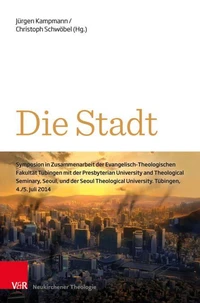Wo ist der »Ort« des Menschen? Wohn- und Arbeitsort, Heimat und Land, ja die Erde als "Ort" des Menschen stehen nicht mehr wie bislang für die äußere und innere Verortung von Menschen. Die Lebensumstände des Smartphone- und IT-vernetzten Hochgeschwindigkeitsmenschen stellen ebenso Fragen an seine Ortsgebundenheit wie die geplanten Weltraummissionen zum Mond oder Mars. Ist der Mensch virtuell delokalisiert - oder gar ein Kosmopolit, der die Erde verlässt? Wie hat sich der familiäre Ort entwickelt? Welchen Ort nehmen wir im Wirtschaftsleben ein? Welche Bedeutung und welche heilsgeschichtliche Deutung kommt alt- und neutestamentlichen Orten zu? Wo und worin sind christliche Gemeinden heute verortet? Diesem breiten Spektrum von Fragen ist der Band gewidmet.
Mit Beiträgen von Johann Hinrich Claussen, Alfred Krabbem Reinhold Ewald, Dirk Engelmann, Klaus Dörre, Rüdiger Lux, Andreas Lindemann, Friederike Nüsssel und Tobias Holischka.
[Of the Place of Humans]
Where is the »place« of humans? The place where people live and work, their home and country, and even the earth as their "place" - these no longer stand for the external and internal placing of people as they have in the past.
The living conditions of high-speed human beings, linked with Smartphones and IT, pose questions about their sense of place just as much as the planned space missions to the moon or Mars. Are humans virtually delocalized - or even cosmopolitans who leave the earth? How has familial place evolved? What place do we occupy in economic life? What is the significance and what interpretation from salvation history is assigned to Old and New Testament places? Where and wherein are Christian communities located today? This volume is dedicated to this broad spectrum of questions.
Wo ist der »Ort« des Menschen? Wohn- und Arbeitsort, Heimat und Land, ja die Erde als "Ort" des Menschen stehen nicht mehr wie bislang für die äußere und innere Verortung von Menschen. Die Lebensumstände des Smartphone- und IT-vernetzten Hochgeschwindigkeitsmenschen stellen ebenso Fragen an seine Ortsgebundenheit wie die geplanten Weltraummissionen zum Mond oder Mars. Ist der Mensch virtuell delokalisiert - oder gar ein Kosmopolit, der die Erde verlässt? Wie hat sich der familiäre Ort entwickelt? Welchen Ort nehmen wir im Wirtschaftsleben ein? Welche Bedeutung und welche heilsgeschichtliche Deutung kommt alt- und neutestamentlichen Orten zu? Wo und worin sind christliche Gemeinden heute verortet? Diesem breiten Spektrum von Fragen ist der Band gewidmet.
Mit Beiträgen von Johann Hinrich Claussen, Alfred Krabbem Reinhold Ewald, Dirk Engelmann, Klaus Dörre, Rüdiger Lux, Andreas Lindemann, Friederike Nüsssel und Tobias Holischka.
[Of the Place of Humans]
Where is the »place« of humans? The place where people live and work, their home and country, and even the earth as their "place" - these no longer stand for the external and internal placing of people as they have in the past.
The living conditions of high-speed human beings, linked with Smartphones and IT, pose questions about their sense of place just as much as the planned space missions to the moon or Mars. Are humans virtually delocalized - or even cosmopolitans who leave the earth? How has familial place evolved? What place do we occupy in economic life? What is the significance and what interpretation from salvation history is assigned to Old and New Testament places? Where and wherein are Christian communities located today? This volume is dedicated to this broad spectrum of questions.

 , qui est-ce ?
, qui est-ce ?